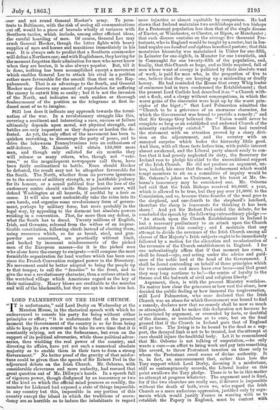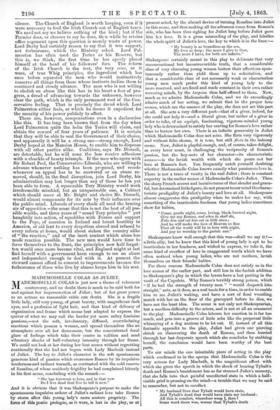LORD PALMERSTON ON THE IRISH CHURCH.
4rirT is unfortunate," said Lord Derby on Wednesday at the Mansion House, in the rhetorical speech with which he endeavoured to console his party for being without either principles or office; "it is unfortunate that at the present moment the Government of the country is so far from being able to keep its own course and to take its own time that it is constantly relying, not on the forbearance, but even on the support of its political adversaries, while those political adver- saries, thus wielding the real power of the country, and directing its affairs, have yet not such a numerical absolute majority as to enable them in their turn to form a strong Government." No better proof of the gravity of that misfor- tune could be given than the speech of Sir Robert Peel in the adjourned debate on the Irish Church. Mr. Osborne, with considerable cleverness and more audacity, had rescued that great question out of Mr. Dillwyn's hands. In a speech full cf vigorous power, though disfigured by an inaccuracy or two of the kind on which the official mind pounces so readily, the member for Liskeard had exposed a state of things impossible in any country but this, impossible in any portion of this country except the island in which the traditions of ascen- dancy are so horrible as to induce the inhabitants to regard mere injustice as almost equitable by comparison. He had shown that Ireland maintains two archbishops and ten bishops for a Protestant population less than that of the single diocese of Exeter' or Winchester, or Chester, or Ripon, or Manchester ; that each diocese contains on the average five thousand Pro- testants, who in England would be taught by a rector, but in Ire- land require one hundred and eighteen beneficed pastors; that this monstrous hierarchy was maintained in Ulster for one-fifth, in Leinster for one-eighth, in Munster for one twentieth, and in Connaught for one twenty-fifth of the population and, finally,- that this Church so huge, and so little required, population, of men whose want of energy is palliated by their absolute want of work, is paid for men who, in the proportion of five to one, believe that they are keeping up a misleading or deadly heresy. Ile had reminded the House that every Whig leader of eminence had in turn condemned the Establishment ; that the present Lord Carlisle had described it as "a Church with- out a flock, and a clergy without congregations, in which the worst gains of the sinecurist were kept up by the worst prin- ciples of the bigot ; " that Lord Palmerston admitted the "Church to be a grievance of an enormous character, for which the Government was bound to provide a remedy ;" and that Sir George Grey believed the "Union would never be complete so long as an established and endowed Church of the minority exclusively existed." The House had received the statement with an attention proved by a sharp divi- sion on the adjournment, and the country with an annoyed surprise which bodes the hierarchy little good. And then, with all these facts before him, with public interest almost awakened, and the Liberal party almost ready to con- fess that it had grossly neglected its duty, the Secretary for Ireland rose to pledge his chief to the unconditional support of the Irish Church. He did not produce an argument, un- less, indeed, his sneer that the only inducement which would tempt members to sit on a committee of inquiry would be Mr. Osborne's jokes as Chairman, or his taunt at Mr. Os- borne's inaccuracy may be considered one. Mr. Osborne had said that the Irish Bishops received 80,000/. a year, which is allowed to be true, but they pay over 21,000/. to the Commission, and BO, because three-fourths of the wool goes to the shepherd, and one-fourth to the shepherd's landlord, therefore the sheep is inaccurate for thinking it has been shorn ! And yet Sir Robert Peel ended the debate, for he concluded the speech by the following extraordinary pledge :— "An attack upon the Church Establishment in Ireland is but a necessary preliminary to an attack upon the Church establishment in this country ; and I maintain that any attempt to divide the revenues of the Irish Church among all classes of Her Majesty's Irish subjects ought to be immediately followed by a motion for the alienation and secularization of the revenues of the Church establishment in England. I for one unhesitatingly affirm that if that moment has come, I shall be found—aye, and acting under the advice and guid- ance of the noble lord at the bead of the Government. I shall be found contending on behalf of those principles which for two centuries and more have ever been—and God grant they may long continue to be!—the centre of loyalty to the throne and the bulwark of civil and religious liberty." Argument, then, is with the present Ministry worthless. No matter how clear the grievance or how vast the abuse, how decided the public feeling or how immoral the tergiversation, still Lord Palmerston, who once declared that the Irish Church was an abuse for which Government was bound to find a remedy, declares now that no remedy shall be now so much as attempted. And he makes this declaration not because he is convinced by argument, or overruled by facts, or doubtful of the disease, or incredulous as to cure, but on the final ground that if the Church in Ireland goes that of England will go too. The living is to be bound to the dead as a sup- port, the decayed limb is not to be treated, lest the attempt at cure should injure the healthful body. Let it be remembered that Mr. Osborne is not talking of amputation,—he only wants a cure—an effort to bring work and pay into something like accord, to throw Protestant taxation on those only to whom the Protestant creed seems of divine authority. It is, in fact, an announcement that, rather than lose the Tory support which Lord Derby, deeming it a misfortune, still so contemptuously accords, the Liberal leader on this point swallows the Tory pledge. There is to be in this matter no attempt at progress whatever. The argument used is final, for if the two churches are really one, if divorce is impossible without the death of both,-even we, who regard the Irish Church as a mere audacious oppression, justified only by argu- ments which would justify France in warring with us to establish the Papacy in England, must be content with silence. The Church of England is worth keeping, even if it were necessary to feed the Irish Church out of English taxes. We need not say we believe nothing of the kind ; but if the Premier does, or chooses to say he does, then while he retains -office argument upon this question is merely waste of power. Lord Derby had certainly reason to say that it was support, not forbearance, which the Ministry asked. Lord Pal- merston has often used the Tories as his Reserve, but this is, we think, the first time he has openly placed himself at the head of his followers' foes. The reform of the Irish Church is the test, the very crux, as it were, of true Whig principles, the ingredient which has once before separated the men who would instinctively conserve all things from those whose instincts incline them to continued and steady advance. The man who is not willing to abolish an abuse like this has in his heart a fear of pro- gress, a dread of advancing towards the unknown, however clear the path, which is the only permanent root of the Con- servative feeling. That is precisely the dread which Lord Palmerston either feels, or which he deems it expedient for the security of his power publicly to affect.
There are, however, compensations even in a declaration like this. It has long been known that from the day when Lord Palmerston quits the helm the Tories will claim, and obtain the reward of four years of patience. It is certain that they will be able to seat the Government of their choice, and apparently it will be a strong one—strong enough, Lord that they will be able to seat the Government of their choice, and apparently it will be a strong one—strong enough, Lord Derby hoped at the Mansion House, to enable him to dispense with all other parties alike. Coalitions, says Mr. Disraeli, are detestable, but he will none the less receive adhesions with a chuckle of hearty triumph. If the men who agree with Sir Robert Peel, the Conservative-Liberals, who are willing to advance whenever nothing has been proposed, and recede whenever an appeal has to be answered or an abuse re- moved, should, in the final disruption, join Lord Derby, his administration may last longer than any of those he has yet been able to form. A squeezable Tory Ministry would work irredeemable mischief, but an unsqueezable one, a Cabinet which should sneer at Mr. Bright and shelve Mr. Disraeli, would almost compensate for its acts by their influence over the public mind. Liberals of every shade all need the bracing air of opposition —the sense that this is not the best of all pos- sible worlds, and three years of "sound Tory principles" put haughtily into action, of squabbles with France and support to the Pope, of coercion in Ireland and latent hostility in America, of aid lent to every despotism abroad and refused to every reform at home, would about sicken the country alike of "the reaction," and of the inert content which alone has made reaction possible. The new men would have time to force themselves to the front, the principles now half forgot- ten would once more become vital, and England might at last find herself with a government keen enough to see an abuse and independent enough to deal with it. At present the steward cannot afford to consent to improvements because the forbearance of those who live by abuses keeps him in his seat.































 Previous page
Previous page